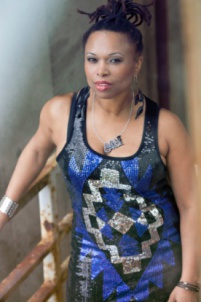Darlene Jackson aka DJ Lady D is one of the most sought after DJs in Chicago who happens to be a woman. Walk into Chicago’s House of Blues Foundation Room on a weekend night and the first thing that hits you when you exit the elevator is the melodic, soulful house grooves that resonate throughout the intimate room. Behind its DJ set-up is a petite, beautiful, caramel skinned woman rocking tight coiffed locks, looking chic and in control of the equipment and the music.
Currently, Lady D celebrates the 20th anniversary of her career and will be embarking on a summer tour to promote her new music project, “All Night Long” on Carillo Music. When she’s not producing or spinning at an event, you can find Lady D teaching young girls ages six to 16 the art of being a DJ for the non-profit organization, Girls Rock! Chicago, where she’s been on staff for the past seven years. We caught up with the busy mom, producer, songwriter and record label owner to get a deeper perspective on the lifestyle of a female DJ.
CD: How did you get into the music business?

Lady D: I had a few friends around me and I had equipment at the house. My son’s father was a DJ. He was always out and I was always home so I began to teach myself some things and learned how to play. I had a friend who is a big promoter in New York now but she and I used to get together and play. She was promoting DJs at this shoe store, Soul Junkie, over at Clark and Belmont. So one day, she invited me to play and I did. A lot of promoters that day came down to see me.
Charles Little was one of promoters who saw me. He ran a promotions company called PURE. PURE was the biggest thing back then; they had all of the club spots and threw the raves. He saw me that day and said, ‘You are amazing and highly marketable! You are going to be a star!’ So after that, he started booking me — everywhere. I began to get a reputation around Chicago and then a reputation around the Midwest. Afterwards, I began to travel nationally and then internationally.
CD: How did that transition to doing production?
Lady D: The things that I did production-wise were more collaborative. I was working with Ron Carroll, Mark Grant, Demarcos Lewis. Working as a writer and poet, lending my pieces to production. Spending time in the studio, I began to learn things myself as well. Especially around 1999 to 2000, I got a job at a record label, SHR — Strictly Head Recording also known as Underground Construction music. I ran a label for Deep House called After Hours. Through observation, I learned a lot of stuff. That’s when software began to be more ‘user friendly’ and easier to manipulate.
CD: What have been some of your challenges being a Black female DJ in the business?
Lady D: Well, as a woman there’s always a challenge in being taken seriously. People want to know your ability before you’re asked to come on board. With a man, there’s an assumption that you already know what he’s doing. With a woman it’s, ‘Do you know what you’re doing?’ I try to establish upfront what my experience and pedigree are because without that, you get it from the security guy too. Being a Black person, there’s certain expectations to play for your own community. But also being a Black person who has always been down with my community. I’ve been able to cross a lot of boundaries and cover a lot of ground. I have never ‘pigeon holed’ myself from the very beginning. If I was asked to play a rave, I didn’t say no. if I was asked to play at lounges, I didn’t say no. If was asked to play at festivals, I didn’t say no. I did it all.

